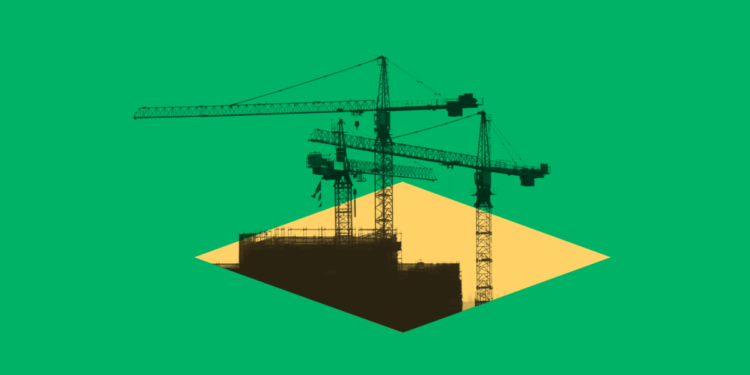This ranking was featured in our 2023 Construction Arbitration Report, which is part of a series of industry-focused arbitration reports edited by Jus Mundi and Jus Connect.
This issue explores the construction industry and presents a goldmine of information based on data available on Jus Mundi and Jus Connect as of May 2023. Discover updated insights into construction arbitration and exclusive statistics & rankings, as well as in-depth global and regional perspectives on construction projects, disputes, & arbitration from leading lawyers, arbitrators, experts, arbitral institutions, and in-house counsel.
The selection of arbitrators is a crucial step in the arbitration process. Construction arbitration is a technical sector with capital-intensive and long-term projects, which requires arbitrators to have specific expertise in the field. However, finding the right arbitrator can be cumbersome, especially in such a specialized industry.
At the time of writing this Report, Jus Connect contains over 9,000 arbitrator profiles, of which 2,013 have appeared in construction arbitration cases available on Jus Mundi.
Key Takeaways
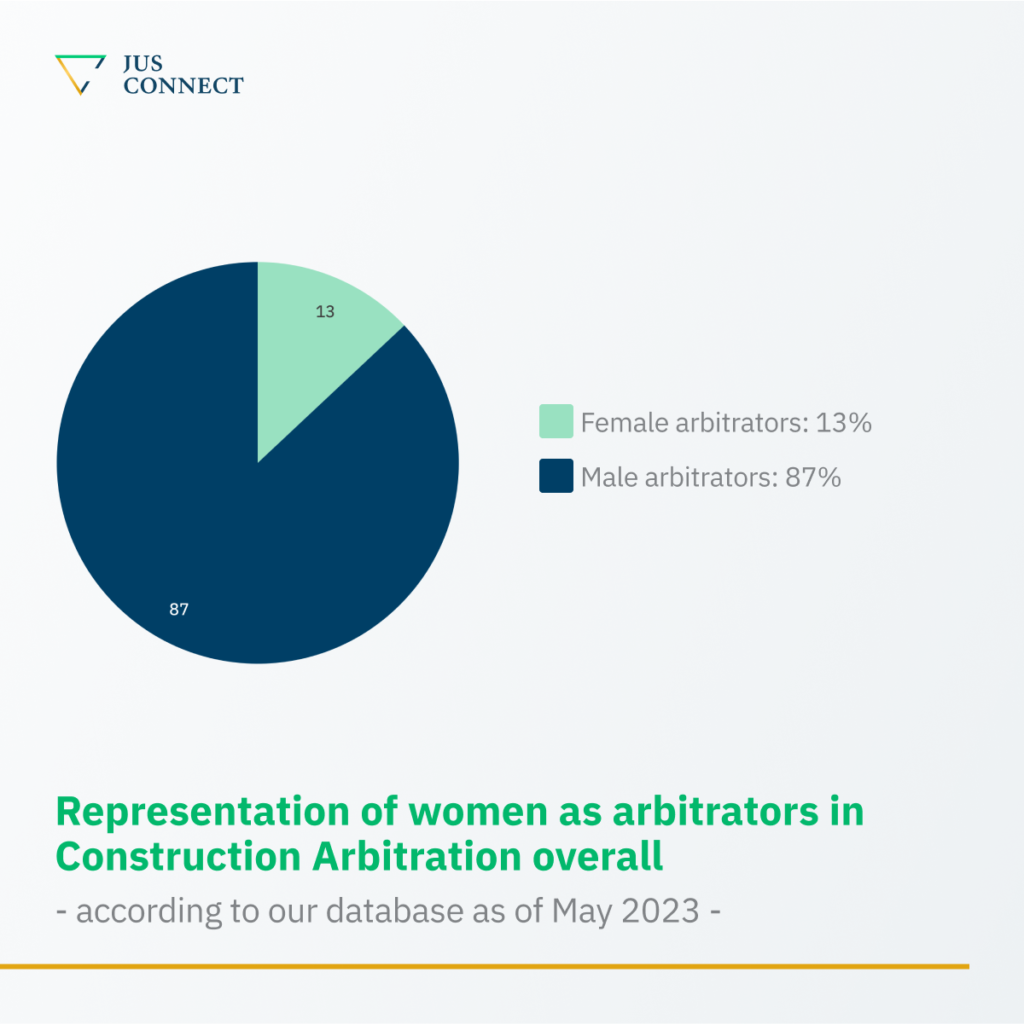
Gender equality and diversity in arbitration have been hot topics for a few years now. While many initiatives have been created to effect change in the legal profession and arbitral community, most arbitral institutions report a fairly unchanged number of female arbitrators appointed.
For the most part, the lack of diversity in international arbitration is still a major concern. It is important that tribunals reflect the broad spectrum of stakeholders who may be affected by their decisions. This also applied to the counsel teams involved
When they are selected, the same few women tend to be appointed and the cliché of the “male, pale, and stale” arbitrators remains difficult toovercome.
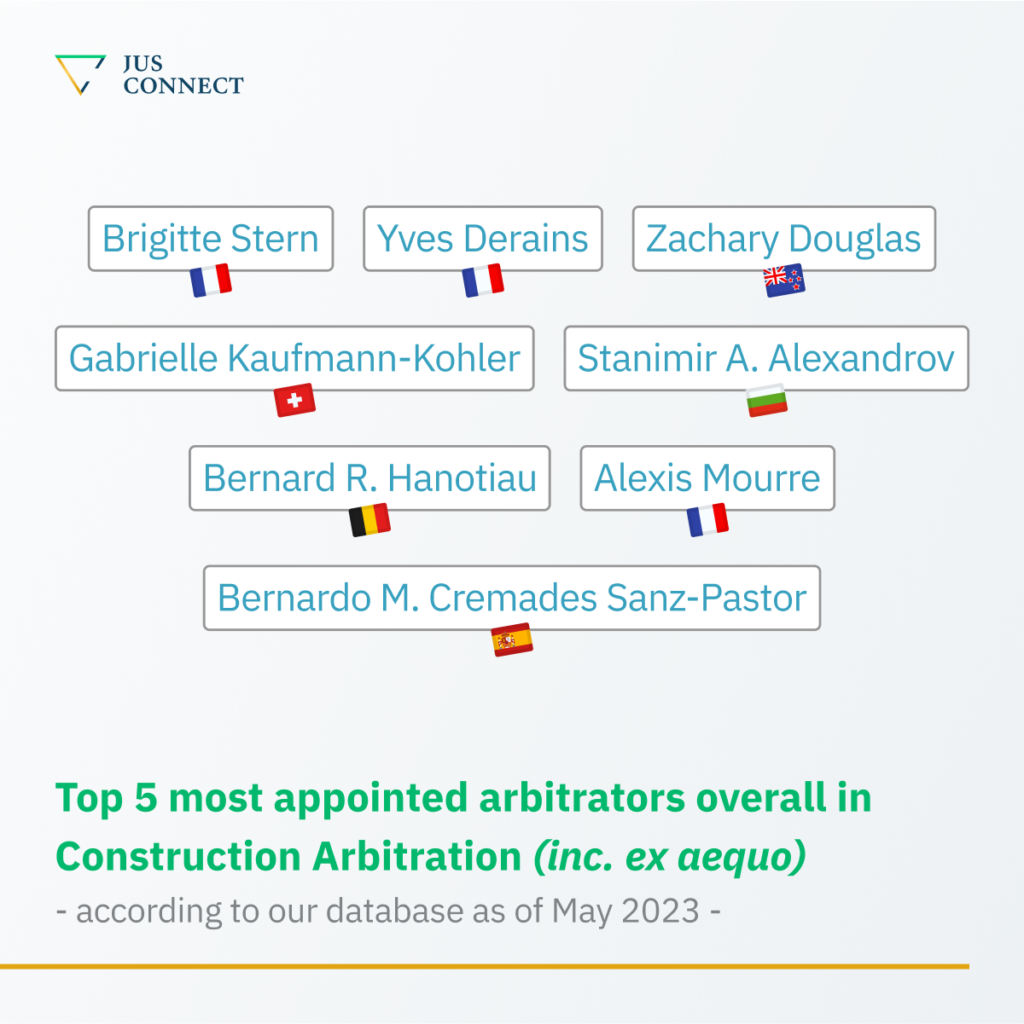
The top 5 most appointed arbitrators in construction arbitration ac- cording to our database proves that the same names tend to come back: all of them have also appeared in other rankings of our Industry Insights Reports, whether it be in mining, electricity & renewables, or oil & gas arbitration.
Of course, their popularity is a testament to their expertise. But little diversity transpires so far in the data analyzed from the cases available on our database, in terms of the most selected arbitrators and the nationali- ties most represented in arbitrators.
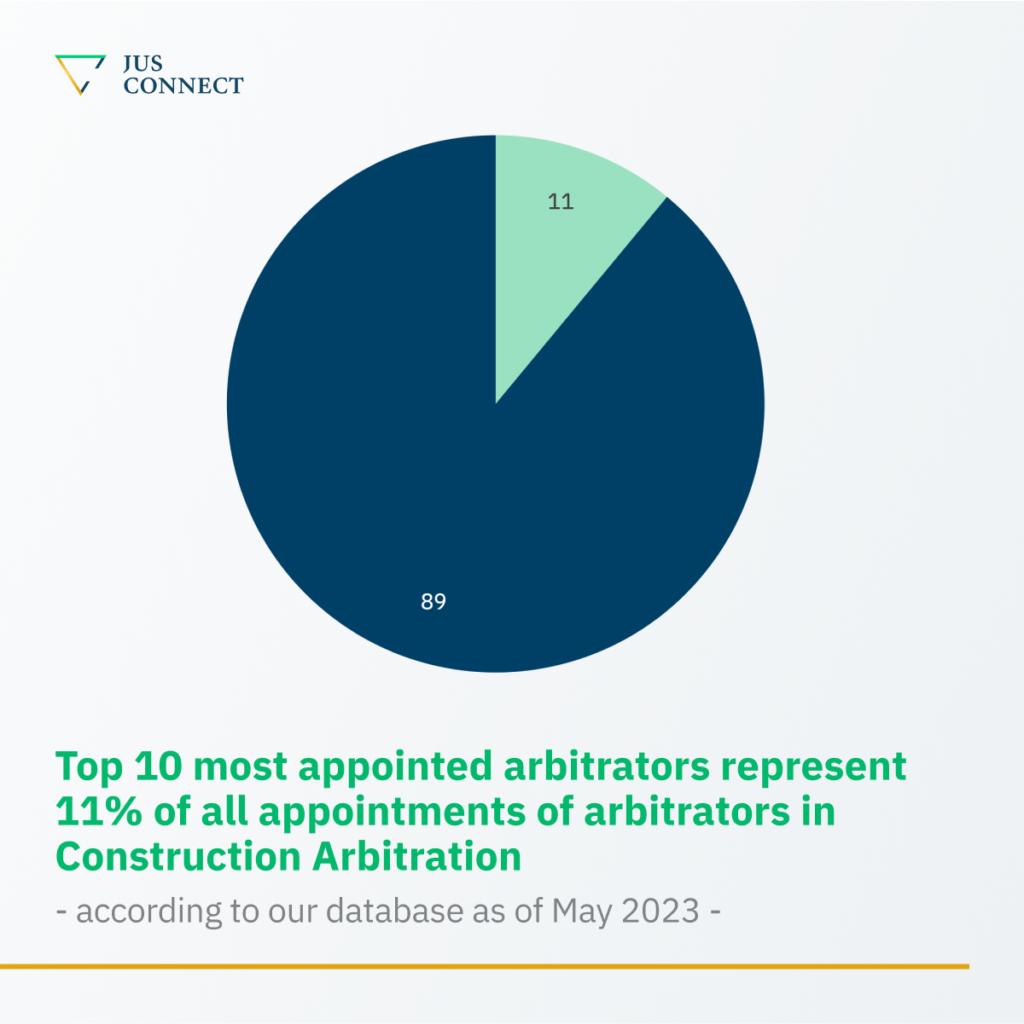
This is also accurate for female arbitrators for which the same handful of names tend to come back, whatever the industry.
For instance, according to our data, Brigitte Stern is an extremely active arbitrator with a range of expertise:
- She is the fifth most active arbitrator in construction arbitration, according to our data.
- She was also in the top 5 most appointed arbitrators in our 2022 Oil & Gas Arbitration Report and 2022 Electricity & Renewables Arbitration Report.
- She arbitrated more mining disputes than any other economic sector, according to our data, and was the most appointed arbitrator in our 2023 Mining Arbitration Report.
- She is exclusively appointed in the construction sector for inves- tor-State arbitrations, according to our data.
- The vast majority of her appointments came from States.
Find all these insights and more via her Jus Connect profile.
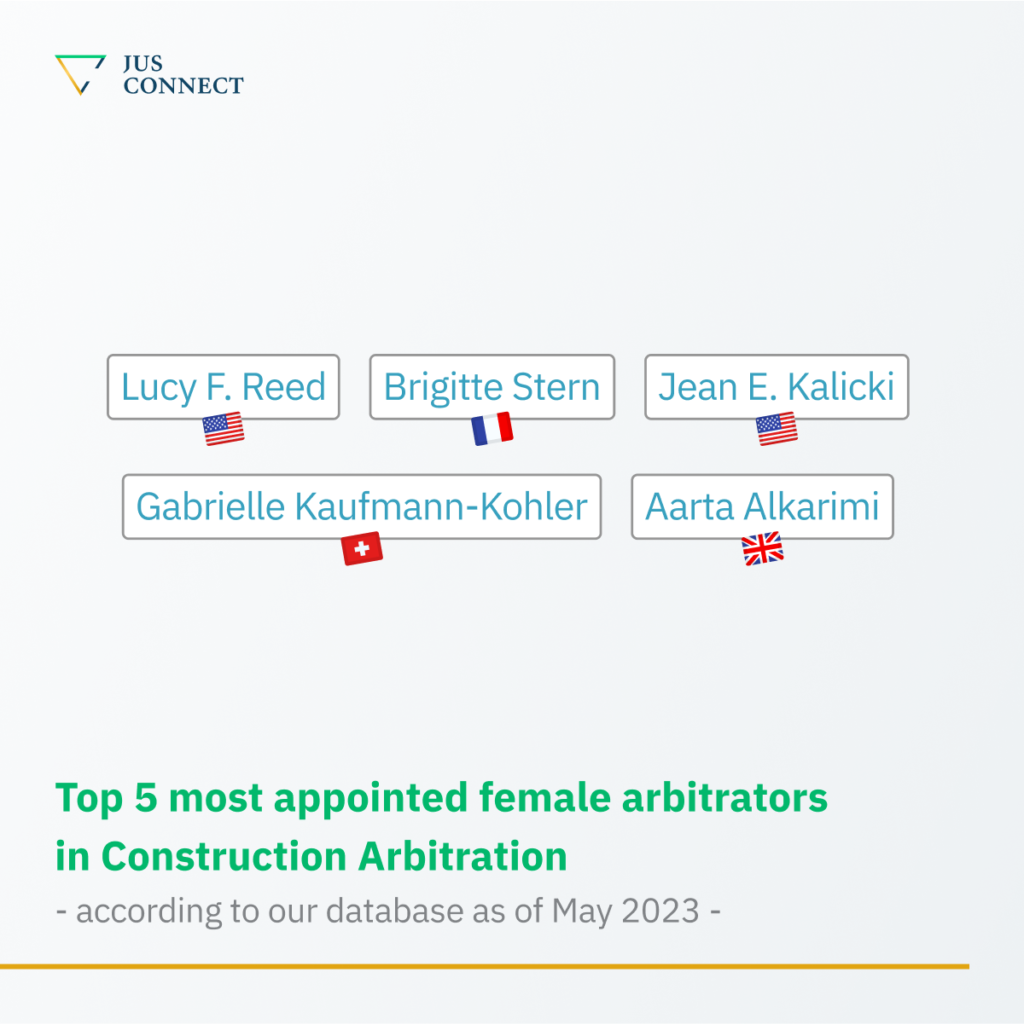
That said, a newcomer to our rankings joins the most appointed female arbitrators in construction arbitration: Aarta Alkarimi is Partner at Chrysa- lis based in Dubai, a British national who speaks English and Persian, and a construction expert.
Find all these insights and more via her Jus Connect profile.
Spotlight on the APAC Region
If the trends shown by two major arbitral institutions in APAC, namely HKIAC and SIAC, are any representation of the regional developments in terms of diversity in arbitration, strives have been made in the region to ensure better representation of female arbitrators.
HKIAC reports some improvements in the representation of women in arbitral tribunals. While in 2021, of the 142 appointments made by HKI- AC, 31 (21.8%) were of female arbitrators; in 2022, of the 159 appoint- ments made by HKIAC in 2022, 43 (27%) were of female arbitrators.
Parties also increasingly appoint female arbitrators for their HKIAC arbitrations. In 2021, of the 118 designations made by parties and confirmed by HKIAC, 15 (12.7%) were of female arbitrators. In 2022, of the 90 designations made by parties and confirmed by HKIAC in 2022, 17 (18.9%) were of female arbitrators.
The number of female arbitrators appointed by co-arbitrators, however, has decreased between 2021 and 2022: 9 out of 46 designations in 2021(19.6%) to 4 out of 35 designations in 2022 (11.4%).
In 2022, SIAC was close to achieving parity in arbitrator appointment. Of the 145 arbitrators appointed by SIAC, 67 (46.2%) were female (46.2%).
Diversity is also a matter of nationalities represented by arbitrators.
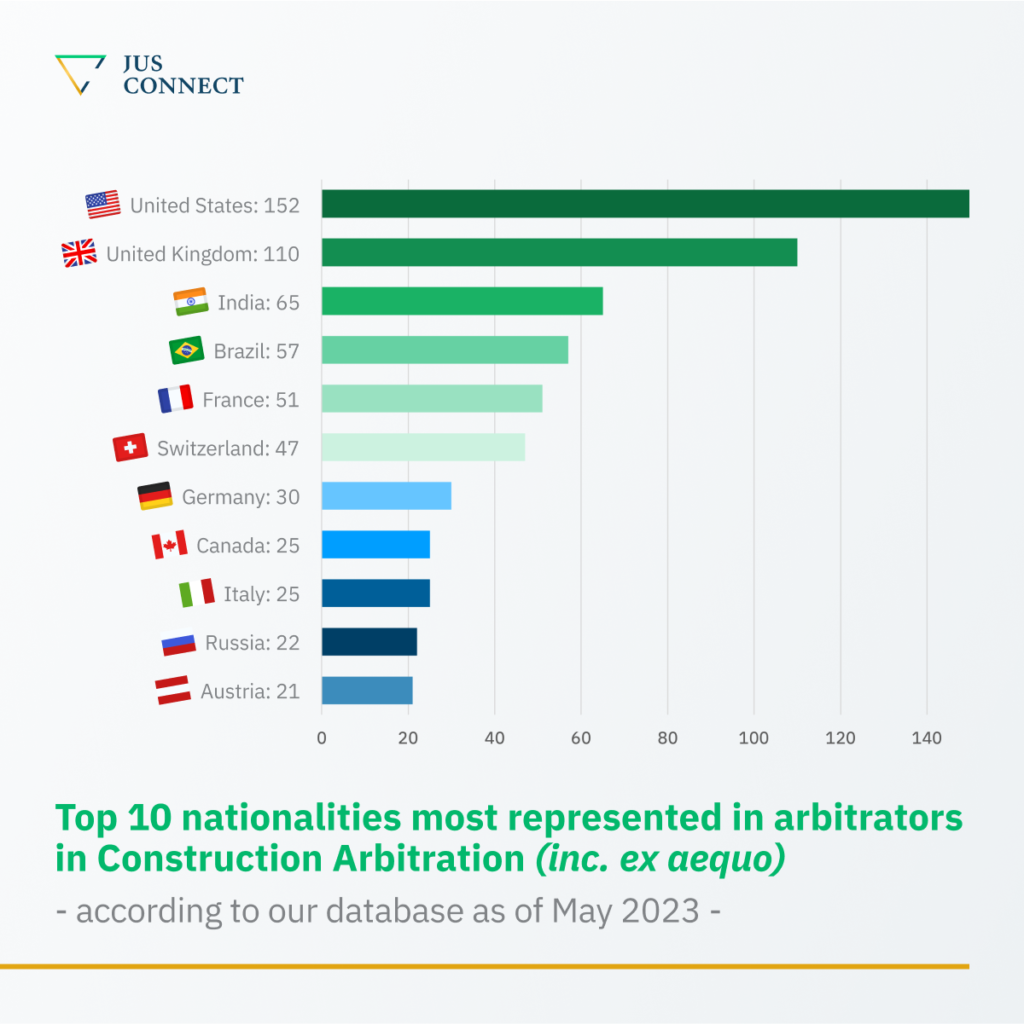
Key Takeaways
ICSID reports in its all-time statistics, i.e., data from 1966 to 2022, that the most appointed arbitrators are American, British, or French. Our top 5 most selected arbitrators in construction arbitration also solely showcase Europeans aside from one Australian. In 2022, it is fair to say that not much has changed as arbitrators are still mostly from North America or Europe, albeit now including some female arbitrators in
the mix.
However, the results are slightly different when focusing on commercial arbitration in the construction sector.
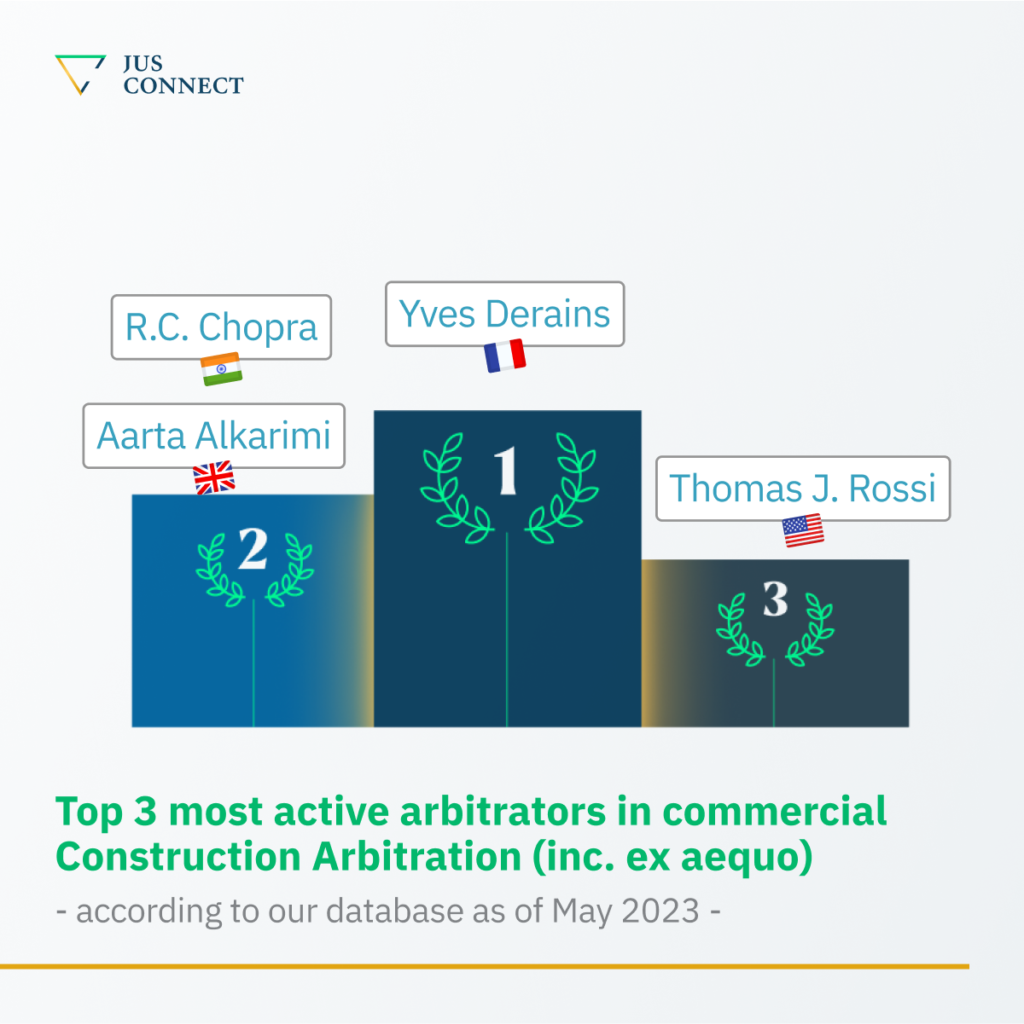
Due to the rise in commercial arbitrations of construction disputes in India and the 2019 amendments to the Arbitration & Conciliation Act 1996 – which were unclear as to whether foreign arbitrators were indeed allowed in Indian-seated arbitrations, an Indian arbitrator enters our top 3 most selected arbitrators in commercial construction arbitration.
In fact, the Indian nationality is the third most represented in arbi- trators appointed in construction arbitration, with 65 Indian arbitrators active in construction arbitration, according to our database.
Brazilian arbitrators are also highly selected. Similarly to India, Brazil has developed a very active domestic arbitration scene which may explain how these two nationalities overtake arbitrators of French nationality. Historically, French arbitrators are some of the most selected arbitrators, as is illustrated by our top 5 most appointed arbitrators in construction arbitration and the top 3 most active arbitrators in commercial construction arbitration.
Since its favorable Brazilian Arbitration Act (BAA) was enacted 26 years ago, commercial arbitration has become Brazil’s most commonly used method of alternative dispute resolution.
Unfortunately, this may all change if the Brazilian Congress approves Bill No. 3,923/21 — meant to amend the BAA. According to the Brazilian Arbitration Committee (CBAr), the main arbitration entity in Brazil, the changes proposed in the bill increase legal uncertainty and weaken the country’s entire arbitration system. Its approval would represent a real step backward, as it promotes undue interference by the State in private proceedings.
Find more data-backed insights in our 2023 Construction Arbitration Report

